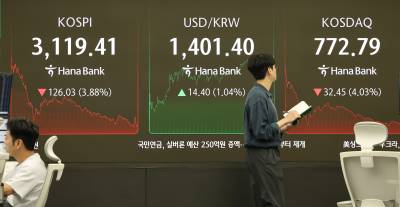- 동북아의 외톨이 자청한 일본
언론은 북한과의 새로운 핵협정을 다루면서 한 가지 골치아픈 사태진전을 간과했다. 일본이 협정에 동의하지 않기로 한 결정 말이다. 일본은 비록 미국·중국·한국·북한·러시아와 함께 협정에 서명했지만 북한이 핵 프로그램 폐기를 약속하는 대가로 받게 될 직접적인 에너지 지원엔 참여하지 않기로 했다. 이런 결정을 내린 나라는 일본이 유일하다. 일본의 이 같은 거부는 1994년 북한과 맺은 마지막 주요 협상 때 보인 행동과 크게 대비된다. 당시 체결된 남북 기본합의서에 따라 일본과 한국은 최대 재정 기여국으로, 약 50억 달러가 드는 2기의 경수로 원자로 건설 비용의 90% 이상을 부담하는 데 동의했다. 북한은 핵 프로그램을 포기하는 대가로 그 돈을 약속받았다. 중국은 당시 협상 참가국이 아니었기 때문에 한푼도 내지 않았다. 그러나 이번엔 일본이 외톨이 신세가 됐다. 이전의 전략에서 크게 이탈한 행동인 동시에 동북아시아에서 우려스러운 변화다. 일본의 불참 결정은 대단히 골치 아픈 국내 정치 현안인 일본인 납치자 송환 문제 때문이다. 아베 신조(安倍晋三) 총리는 지난해 9월 집권 이래 납치자 문제 해결을 국수주의적 정책의 핵심 과제로 삼았다. 북한은 70~80년대 일본인 13명을 납치한 사실을 인정했으나 일본은 피랍 일본인이 17명이라고 주장한다(실제 수는 그 이상일지 모른다). 아베는 이 문제에 대중의 관심을 불러일으킨 일본의 첫 정치인 중 한 명이다. 실제로 그는 납치자 문제 해결을 최우선시하고 “결코” 타협은 없다며 총리직에 올랐다. 이 같은 수사는 불행히도 그를 궁지로 몰았다. 핵무장한 북한은 일본으로선 가장 끔찍한 악몽이다. 그럼에도 납치자 문제를 지나치게 현안으로 삼은 결과 아베는 이번 6자회담에서 제기되지 않은 그 문제가 해결되기 전까진 북한과의 어떤 협상에도 협조하지 않는 인물로 여겨진다. 일본과 북한은 고이즈미 준이치로(小泉純一郞) 전 총리와 김정일이 2002년 9월 평양에서 정상회담을 한 이래 납치자 문제에서 전혀 진전을 보지 못했다. 납치 문제가 일본 국민의 공감을 사는 이유는 이해하기 쉽다. 그러나 아베의 문제는 보다 깊은 ‘역학관계’를 반영한 측면도 있다. 미국에선 최근 신보수주의자들의 힘이 약화돼 왔지만 일본에선 신보수주의자들의 힘이 강화됐다. 아베 자신은 네오콘이 아니다. 그러나 보수적 민족주의자인 그의 등장은 일본 내 네오콘들에게 새로운 힘을 불어넣는 동시에 이들이 권력에 접근하도록 했다. 갈수록 수가 느는 이들 젊은 정치인은 종전 후 미국이 기초한 일본 평화헌법을 개정해 국방정책에서 일본의 재량권을 확대하려 할 뿐 아니라 일본의 역사적 과오도 되짚으려 한다(예컨대 도쿄 전범재판의 판결을 “승자가 강요한 정의”로 여긴다). 이들은 북한과의 어떤 타협에도 반대한다. 주도적 네오콘 중 한 명인 나카가와 쇼이치(中川昭一) 자민당 정조회장은 미국이 6자회담에서 북한을 테러 사주국 명단에서 제외하려 하자 이를 비난했다. 이런 태도는 미국과 일본의 긴장을 고조시킨다. 일본의 네오콘들은 6자회담 미국 대표인 크리스토퍼 힐 미 국부무 동아태 차관보를 비난했다. 그들은 미국이 이 지역에서 강력하게 행동하기를 거부하거나 그렇게 하지 못하는 데 갈수록 좌절감을 느낀다. 동시에 강력한 미국의 옛 모습을 그리워한다. 그들은 중국이나 한국과의 관계를 강화하거나 평화와 안보를 목표로 한 지역적 차원의 해결책 모색도 꺼린다. 그러나 일본은 행보에 신중해야 한다. 아시아에서 외톨이로 남으면 매우 위험해지기 때문이다. 북한과 맺은 새로운 협정은 많은 우여곡절이 예상된다. 만일 협정이 실패로 돌아가면 일본은 아시아에서 가장 큰 비난을 받을지 모른다. 협정을 지지하지 않았기 때문이다. 만일 일본이 에너지 지원과 납북자 문제를 계속 연계시킨다면 특히 중국·한국 등 인접국의 의혹을 살 우려도 있다. 다시 말해 일본이 자체 핵무기 개발을 염두에 두고 북한의 핵보유를 눈감으려 한다는 지적이다. 일본의 입장은 대미 관계 약화를 초래할 위험도 있다. 그렇게 되면 북한에 맞선 일본의 방위와 억지력도 훼손된다. 따라서 6자회담은 일본이 자신의 안보를 보장하는 최선의 길이다. 아베 정부는 진정코 진실을 밝히고 용기를 검증받아야 할 순간을 맞았다. 일본이 자존심을 꺾고 북한의 비핵화에 중요한 일익을 맡을 능력이 있을까. 불행히도 아베의 인기 하락은 그럴 가능성을 떨어뜨린다. 아베는 자신의 정책적 정체성인 납치자 문제 해결보다 안보정책과 북핵 문제를 우선시할 때 보수적인 지지층이 떨어져나가지 않을까 우려한다. 그러나 만일 그가 일본의 국내 정치를 국가의 전략적 관심사보다 계속 우선시한다면 아베는(그리고 일본은) 장기적으로 더 높은 대가를 치르게 된다. [필자는 아사히신문의 외교담당 수석기자이자 아시아 소사이어티의 국제위원회 회원이다. 신저 ‘한반도 문제(The Peninsula Question)’가 곧 출간된다.] Stuck on the Sidelines Lost in the press coverage of the new nuclear deal with North Korea was a disturbing development: Japan's decision to remain the odd man out. Although it signed the agreement alongside Washington, Beijing, Seoul, Pyongyang and Moscow, Tokyo alone refused to provide any direct energy assistance to North Korea, in exchange for which Pyongyang has promised to start dismantling its weapons programs. Japan's refusal stands in stark contrast to its behavior the last time a major deal was struck with North Korea: the 1994 Agreed Framework. Under the 1994 deal, Japan and South Korea were the largest financial contributors, agreeing together to pay more than 90 percent of the estimated $5 billion construction costs for two light-water nuclear reactors, which North Korea was promised in return for giving up its weapons programs. China, which was not party to the deal, paid nothing. This time, however, Japan is the outlier: a radical departure from its tactics in the past and a worrisome shift in Northeast Asia. Japan's decision not to participate owes to a particularly thorny issue in the country's domestic politics: the question of the abductees. From the time he took office last September, Prime Minister Shinzo Abe has made settling the abductee issue central to his nationalist appeal. North Korea acknowledges having kidnapped 13 Japanese citizens during the 1970s and 1980s, but Tokyo claims there are 17 victims, and the real number could be even higher. Abe was one of the first Japanese politicians to raise public awareness of the issue, and came to office swearing to make it his "top priority," and "never" to compromise. Such rhetoric, unfortunately, has now painted him into a corner. A nuclear-armed North Korea is Japan's greatest nightmare. Yet having made so much of the abductee issue, the prime minister cannot be seen to cooperate on any deal with Pyongyang until that problem (which was not raised in the Six-Party Talks) is solved. And so far, Japan and North Korea have made no progress on the matter since a Pyongyang summit between Junichiro Koizumi and Kim Jong Il in September 2002. It's easy to understand why the kidnapping issue resonates with Japan's public. But Abe's problems also reflect a deeper dynamic. Even as the power of Washington's neoconservatives has declined in recent years, Japan's own neocons have been on the rise. Abe may not be a neocon himself, but as a conservative nationalist, his ascension has given the neocons new clout and access to power. These young politicians, who are growing in number, favor revising Japan's American-drafted pacifist Constitution to give Tokyo a freer hand on defense policy and redressing what they see as historical wrongs, such as the verdicts of the postwar Tokyo Tribunal (which they decry as "victor's justice"). They also oppose any compromise with North Korea. Shoichi Nakagawa, chairman of the ruling Liberal Democratic Party's Policy Research Council and a leading neocon, has already criticized Washington's offer to discuss de-listing North Korea as a state sponsor of terror in the Six-Party Talks. Such language is raising tensions between Washington and Tokyo. Assistant Secretary of State Christopher Hill, lead U. S. negotiator on North Korea, has been criticized by the Japanese neocons. They feel increasingly frustrated with Washington's refusal or inability to act in a forceful way in the region, and miss the muscular America of old. And they are reluctant to strengthen ties with China and South Korea or to explore regional approaches to peace and security. Japan should tread carefully, however; remaining the odd man out in Asia could become very dangerous. The new deal with Pyongyang will likely go through many ups and downs. If it collapses, Japan could bear most of the blame in Asia for refusing to support it. If Japan continues to hold its energy assistance hostage to the abduction issue, it may also invite suspicion from neighboring countries, especially China and South Korea, that Tokyo secretly hopes to ensure Pyongyang keeps its nukes as an excuse for Japan to explore its own nuclear option. Japan's stand also risks weakening relations with the United States, which would undermine Japan's defense and deterrence power vis-a-vis North Korea. The Six-Party process is thus the best way for Japan to ensure its security. The Abe administration faces a real moment of truth and test of courage: can it swallow its pride and play an essential part in the denuclearization of North Korea's Unfortunately, Abe's declining popularity makes this less likely. He seems to be afraid of alienating his most conservative constituencies by putting security policy - and the North Korean nuclear question - ahead of his identity politics, which center on the abduction issue. But if he continues putting Japan's domestic politics above its national strategic interest, Abe - and Japan - will end up paying a much higher price in the long term. Funabashi is chief diplomatic correspondent for the Asahi Shimbun in Tokyo and an International Council member of the Asia Society. His new book, "The Peninsula Question," is forthcoming.
ⓒ이코노미스트(https://economist.co.kr) '내일을 위한 경제뉴스 이코노미스트' 무단 전재 및 재배포 금지










![‘채널주인부재중’으로 본 크리에이터 생존 전략 [김지혜의 ★튜브]](https://image.isplus.com/data/isp/image/2025/07/27/isp20250727000081.400.0.jpg)
![마지막에 한방이 있다 ‘흑백리뷰’ [김지혜의 ★튜브]](https://image.isplus.com/data/isp/image/2025/07/06/isp20250706000027.400.0.jpg)



당신이 좋아할 만한 기사
브랜드 미디어
브랜드 미디어
"와이파이 이용 가격이..", 북한 여행 간 러시아인들 후기
세상을 올바르게,세상을 따뜻하게이데일리
이데일리
이데일리
"월드컵 중요"…손흥민 마음 속 새 팀은?
대한민국 스포츠·연예의 살아있는 역사 일간스포츠일간스포츠
일간스포츠
일간스포츠
진성준 "코스피 안 망한다"…'대주주 기준 상향' 반대
세상을 올바르게,세상을 따뜻하게이데일리
이데일리
이데일리
[마켓인]IPO 실패시 회수 어떻게?…구다이글로벌 CB 투자 딜레마
성공 투자의 동반자마켓인
마켓인
마켓인
'구독하면 200만원 주식 선물', 팜이데일리 8월 행사 시작
바이오 성공 투자, 1%를 위한 길라잡이팜이데일리
팜이데일리
팜이데일리